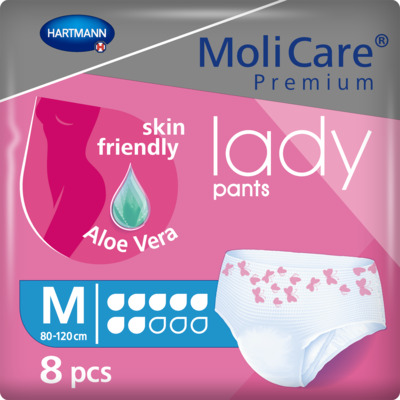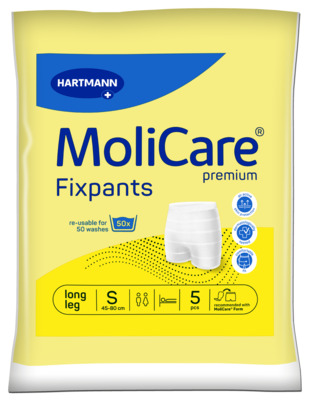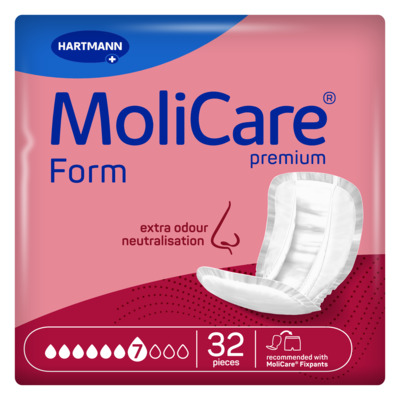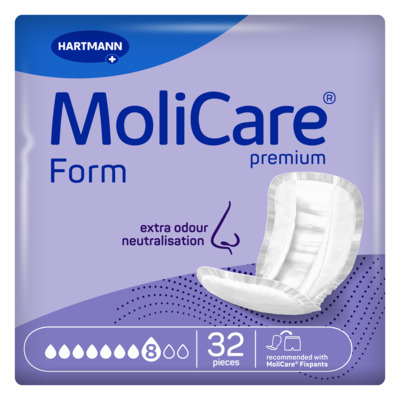Incontinence Advice
Identifying incontinence: the signs that indicate bladder weakness
We explain to you what indicates that you or someone else is incontinent. You will also learn more about how you can discuss the delicate issue of incontinence with those affected and how you can support them. You can also purchase pads for incontinence from our website to help them manage their symptoms.

General signs, causes and symptoms of urinary incontinence
Incontinence, also commonly referred to as bladder weakness, comes in many forms and has many causes. For many people with incontinence, the condition negatively affects their self esteem and leads to social withdrawal.1 As an extremely intimate issue, it is understandable that people feel uncomfortable discussing the signs of incontinence among their wider circle of friends. And shame often inhibits people from seeking out medical help when the first symptoms of urinary incontinence develop. Those affected by incontinence are definitely not alone: Estimates indicate that about 9 million people currently have the same questions about incontinence.
It is possible to have an active and carefree life with incontinence. There are lifestyle changes, medications, pelvic floor exercises and quality products that can all help. But first, it is important to identify the symptoms and then have an open discussion about the condition, whether with a trusted person or your physician.
Let’s look at the signs that indicate bladder weakness and how you can support someone living with incontinence.
Definition: What is incontinence?
Urinary incontinence refers to any involuntary loss of urine, whether it’s just a few drops or larger volumes.
The term ‘incontinence’ comes from the Latin word ‘incontinens’ and means ‘not holding together’. Bladder weakness, as incontinence is commonly known as, can develop in people of any age and gender, but is seen most commonly in people aged 65 and above. Women are more often affected by urinary incontinence than men. For example, stress incontinence, when urine leaks out with physical exertion, affects about three times as many women in Germany as men. Pregnancy can also trigger temporary or long-term bladder weakness. As well as urinary incontinence, there is also faecal incontinence. This is less common and typically occurs in advanced age. We have an article dedicated to urge incontinence. Read it >>
Am I incontinent?
‘You have a bladder the size of a thimble’: expressions like this are often used to tease friends and acquaintances who are always going to the toilet. But this is not necessarily a sign of bladder weakness. People who drink lots of fluids over the day and therefore have to go to the toilet often are not incontinent.
But do you involuntarily release urine when you cough, sneeze or lift a heavy object, for example? Do you often have such a strong urge to urinate that sometimes you don’t make it to the toilet in time? Or do you wake up sometimes in the mornings and notice that the bed is wet? Then you could be experiencing some of the common symptoms of bladder weakness.
When and how much urine you lose may indicate what type of incontinence you have and how it can be treated.
The following types of incontinence are common:
- Stress incontinence: This type of incontinence develops if the pelvic floor muscles and/or the urethral sphincter muscles are damaged. Urine leaks out if you physically exert yourself. Triggers include lifting heavy objects or coughing, sneezing or laughing. Women are affected more often than men.
- Overflow incontinence (incontinence with chronic urinary retention) If the bladder cannot be emptied completely, this is called overflow incontinence. The urethra -
,the tube that transports the urine -,is either constricted by a blockage and/or the bladder muscles are weakened. Overflow incontinence is particularly common in older men. The most frequence cause is that the urethra is blocked by an enlarged prostate. - Urge incontinence: This form of incontinence is caused by bladder muscles that are either overactive or underactive. The urge to urinate is then abruptly triggered, even if the bladder is not full. Initially, the urine can often still be retained but a deterioration leads to uncontrolled loss of urine.
- Reflex incontinence: This type of incontinence happens due to a sudden spasm of the bladder's detrusor muscle. This can be the result of problems with the nervous system such as nerve damage, for instance, in the spinal cord or brain, lead to involuntary loss of urine.
- Extraurethral incontinence: This is sudden or constant loss of urine, for example, through fistulae caused by inflammation, trauma or cancer, or congenital anomalies. Fistulae are small passageways that can develop inside the body. If a fistula joins the bladder to the vagina or the rectum, urine dribbles through the fistula to the outside of the body.
- Mixed forms can also occur with the most common combination being a mixture of urge and stress incontinence.
- Temporary incontinence: After pregnancy or prostate surgery, many people experience temporary involuntary loss of urine. The symptoms often disappear completely.
- Faecal incontinence: A less common form of incontinence. Faecal incontinence means the involuntary passing of gas, liquid and/or solid stools.7
Contact a trusted physician if you identify that you have signs of bladder weakness. Therapeutic treatments can be very successful, particularly with less severe incontinence.

Identifying & helping with incontinence
Incontinence is a subject people can find it hard to talk about – regardless of whether you are affected yourself or you suspect that someone else is suffering from incontinence. But talking about incontinence can be very helpful and improve the quality of life of those affected enormously.6
If you are reading this, then it is likely you suspect someone in your family or circle of friends that you suspect has incontinence. Below are the symptoms to look out for when you think someone may be incontinent.

Signs that a person is affected by incontinence
Usually there are a number of indications that suggest that someone is experiencing bladder weakness. The more of these signs that apply, the more certain you can be that the person is affected by incontinence.
- Smell of urine, either on the person themselves or in their home or apartment
- A previously active person withdraws more and more and only leaves the house for short periods
- A toilet must always be close by and excursions or activities are only undertaken if it is certain that there is a toilet nearby
- Frequent changes of clothing
- Spots on clothing or seats
- Gatherings are kept as short as possible
- You find pantyliners in the bathroom although the person who is possibly affected is unlikely to have had a period for a long time or is male
- The person drinks remarkably little8
Here are some helpful tips that can help you to support someone live more carefree and actively with incontinence.
What can you do to help someone with incontinence?
The most important thing first: act! Even if it is uncomfortable at first, you have the opportunity to greatly improve the person's quality of life. Many people, particularly much older people, do not know that a good and active life with incontinence is possible thanks to modern incontinence products and treatment options.
How you go about this depends very much on your relationship with the affected person. An open conversation is often the first step. There may also naturally be cases when you have to proceed more cautiously and you cannot discuss the subject of incontinence directly. We prepared an useful article with "How To Maintain Good Hygiene For Someone You Care For"
We have collected some suggestions for this not so easy situation.
Possible icebreakers for talking about incontinence:
- Use recent studies and figures as a conversation starter.
- If you notice that someone is going to the toilet more often than usual, asking whether they have a bladder infection can also be a gentle introduction to a conversation about incontinence.
- You can also talk a little about yourself. As a woman you may be familiar with temporary bladder weakness during pregnancy or have heard about it from pregnant women in your circle of friends.
- As a man you can refer to the widespread incontinence that occurs during and after pregnancy or after prostate surgery to give the person affected the feeling that he or she is not alone with the problem. Many people just do not talk about it.
How you can help someone with incontinence
Once the ice has been broken, you can then offer concrete help or be active yourself:
- If the person has mild incontinence, targeted training of the pelvic floor muscles can greatly reduce symptoms. You could, for example, offer to search online for exercise programmes in your neighbourhood. You can also find some simple exercises on our website to make a start.
- Pelvic floor training is suitable for people of all ages. Why not make a start on it together? The courses often have participants who are the same age, including many others experiencing the same condition.
- Keeping a bladder diary is often the first step to identifying for yourself when and how much urine is actually lost. Your doctor can also help you to better define the type and severity of the bladder weakness.
- Recommend, if possible, that the person visits their physician. Emphasise that the issue is absolutely routine for the doctor. Talking about it is the only way for their doctor to identify the underlying physical causes and recommend a suitable treatment. If the person does not feel comfortable confiding in the general practitioner, urology and gynaecology clinics can also be good places to contact.
- Depending on the diagnosis, for some patients surgical procedures may also provide relief. The specialist will advise you in this case.
- Many people do not know that menstrual pads and incontinence pads are fundamentally different because urine usually has to be absorbed and locked up inside the product in much larger quantities and considerably faster. The smell of urine is neutralized by high quality incontinence products. Unlike blood, urine also irritates the delicate skin in the genital area. Incontinence products must therefore keep the skin quite dry and protect it. You can learn more hereabout the variety of incontinence products available.
- Would you like to make a start and organise quality incontinence products for the person affected? Then order samplesfree of charge and with absolutely no obligation from MoliCare®. This way you avoid paying for products that may not meet the needs of your relative or friend. The products are delivered in discreet packaging. Go to the sample order page.
- For some people, a self-help group can also be a good point of contact. You can find one near you online.
- If it involves a person who you are not close enough to for such a conversation, more subtle ideas may still help. At work you could, for example, ensure that the cubicles in the men’s toilets have rubbish bins to encourage the discreet disposal of incontinence products. You can also plan regular toilet breaks in meetings if you notice that a colleague may have bladder issues.
- Important: If the affected person indicates that they do not want to talk about the subject or do not need any help, you should accept this and possibly try to have the conversation at a later date. Always keep in mind that problems with urinating are associated with shame for many people.
And finally the most important: be brave! With the help of modern medicine, lifestyle changes and reliable products, many people with incontinence can live and enjoy their life without major restrictions.
Sources
PAUL HARTMANN AG & Edelman Intelligence: ‘Eine europäische Studie zum Leben mit Inkontinenz’ [A European study on living with incontinence], February 2019, n=2,311 persons aged at least 45 years old who have incontinence. The study was conducted in Germany (n=505), France (n=502), the Czech Republic (n=502), Spain (n=502) and Switzerland (n=300)
3 Definition source: Definition from the International Continence Society, Abrams et al., 2002: The Standardisation of Terminology of Lower Urinary Tract Function), page 16.32
4 & 5 & 6 www.breaking-the-silence.de
PAUL HARTMANN AG & Edelman Intelligence: ‘Eine europäische Studie zum Leben mit Inkontinenz’ [A European study on living with incontinence], February 2019, n=2,311 persons aged at least 45 years old who have incontinence. The study was conducted in Germany (n=505), France (n=502), the Czech Republic (n=502), Spain (n=502) and Switzerland (n=300)
7 Faecal incontinence
Diagnosis, treatment and importance of sacral nerve stimulation, 28 August 2017, P. Gaßmann & A. E. Gohrbandt Springer.
8 Deutsches Netzwerk für Qualitätsentwicklung in der Pflege [German Network for Quality Development in Nursing] (publisher) Expert standard for awareness of urinary incontinence in nursing, 1st update 2014, page 38.

MoliCare® Premium Lady Pants 7 Drops
<h2>Comfort and Confidence</h2> <p>Experience the comfort and confidence of MoliCare® Premium Lady Pants, specially crafted for moderate incontinence. These slimline and discreet incontinence pants feel just like regular underwear, but they offer superior dryness and protection you can trust from MoliCare®.</p> <p>If 7 drops is too much or too little, we still have plenty of other MoliCare® Premium Lady pants, available in different drop capacities, to suit your every incontinence need. Whichever you go for, our Premium Lady Pants provide the ideal support for your moderate incontinence needs, empowering you to carry on with your daily activities worry-free.</p> <h2>Discreet fitting incontinence pants</h2> <p>The Premium Lady Pants are thoughtfully designed with a lower waistline, ensuring a discreet fit under your clothes. The soft, pH-balanced, and breathable material embraces your body, providing maximum comfort. The quick-drying central layered core rapidly absorbs and locks away moisture, keeping you dry and comfortable throughout the day. Additionally, the Aloe Vera treated top sheet safeguards delicate skin.</p> <p>Worried about leaks? Don't be. Our Premium Lady Pants feature elasticated cuffs that protect against leakage, and special neutralisers seal in odours, leaving you feeling confident, dry, and fresh.</p> <p>These incontinence pants cater to active women as well as those with reduced mobility, providing reliable protection against moderate bladder weakness.</p> <h2>Choosing your Size</h2> <p>Measure waist at the largest width between the waist and hips. Select the product size based on the below sizing.</p> <ul> <li>Medium: 31-47 inches (80-120cm)</li> <li>Large: 47-59 inches (100-150cm)</li> </ul> <h2>Fast delivery</h2> <p>Managing incontinence doesn't have to be a hassle. Our delivery service ensures you receive the products you need right at your doorstep. With easy online reordering and fast shipping, we even offer free delivery on orders over £50.</p> <p>If you have any questions or need assistance, our friendly customer service team is here to help. Just give us a call at 0800 028 9470 to discuss your requirements. Discover the comfort, confidence, and convenience of MoliCare® Premium Lady Pants today.</p>
MoliCare® Premium FixPants Long Leg
<h2>Washable Net Fixation Pants</h2> <p>If you are looking for a comfortable and secure way to manage incontinence, MoliCare® Fixpants Long Leg are a great option when worn with large pads. For men and women of different ages, shapes and sizes, this product is the right choice for you. These pants boast a dense fabric structure that combines air-active properties with ladder resistance, ensuring not only reliable support but also maximum comfort throughout the day. MoliCare® Premium Fixpants provide a safe and hygienic hold for MoliCare® Premium Form pads, giving you peace of mind in any situation.</p> <p>For both women and men, these fixation pants are the perfect way to keep large incontinence pads securely in place. Thanks to the two-piece system, you can count on guaranteed secure fixation, allowing you to go about your daily activities with confidence.</p> <p>Crafted from ladder-resistant dense material, these fixpants maintain their durability while preserving the pad's wetness indicator, ensuring you are always aware of its status.</p> <h2>Unparalleled Comfort</h2> <p>Indulge in the unparalleled comfort of these fixpants, featuring a soft waistband, skin-friendly air-active material, and cross-elasticated threads that provide a close fit tailored to your needs.</p> <p>With the added benefit of various leg lengths to choose from, you can experience optimum comfort and find the most suitable fit for your body shape and preferences.</p> <p>MoliCare® Fixpants are your go-to choice for reliable and comfortable fixation pants, ensuring larger incontinence pads remain securely in place. Embrace the confidence and convenience of washable fixpants, designed to provide the best support and fit for your needs. Bid farewell to worries and discomfort, and embrace worry-free and comfortable days with MoliCare® Fixpants.</p> <h2>Choosing your Size</h2> <p>Measure waist at the largest width between the waist and hips. Select the product size based on the below sizing.</p> <p>Sizes go up to 5 x extra large for larger sizing and bariatric users.</p> <ul> <li>Small: 16-32 inches (45-80cm)</li> <li>Medium: 24-40 inches (60-100cm)</li> <li>Large: 32-48 inches (80-120cm)</li> <li>Extra Large (XL): 40-64 inches (100-160cm)</li> <li>Extra Extra Large (XXL): 56-72 inches (140-180cm)</li> <li>Extra Extra Extra Large (XXXL): 63-79 inches (160-200cm)</li> <li>5X Large: 79-94 inches (200-240cm)</li> </ul>
MoliCare® Premium Form 7 Drops
<h2>Straight from the manufacturer</h2> <p>Additional benefits of MoliCare® Premium Form 7 drops include:</p> <ol> <li><strong>Enhanced Leakage Protection</strong>: The cuffs offer an additional layer of protection, ensuring extra leakage protection and providing an enhanced feeling of security.</li> <li><strong>Efficient Moisture Management</strong>: The acquisition and distribution layer acts as a barrier, promoting a drier surface with a balanced pH level, ensuring optimal comfort and maintaining skin health.</li> <li><strong>Rapid Urine Absorption</strong>: The specialised channel enables faster urine absorption, particularly during the second micturition, ensuring maximum dryness and protection.</li> <li><strong>Superior Comfort and Fit</strong>: Elastic seams ensure superior comfort and an impeccable fit, allowing you to move freely and confidently.</li> <li><strong>Premium Quality Breathable Material</strong>: Crafted from high-quality, breathable materials, these pads offer maximum leakage protection without compromising comfort.</li> <li><strong>pH-Balanced for Skin Health</strong>: MoliCare® Premium Form 7 Drops are pH-balanced to preserve and maintain your skin's health, even during prolonged use.</li> <li><strong>Wetness Indicator</strong>: Stay informed with the integrated wetness indicator, guiding you when it's time for a change, ensuring optimal hygiene and convenience.</li> </ol> <h2>Neutralise incontinence odours</h2> <p>Individually shaped to adjust to your body, MoliCare® Premium Form 7 Drops provide a comfortable fit and exceptional comfort. Available in a range of absorbencies, these large incontinence pads are ideal for moderate to very severe incontinence. Equipped with elasticated seams and fluid repellent inner cuffs, they offer added protection against leakages, providing you with peace of mind throughout the day.</p> <p>At the core of these soft, breathable pads lies MoliCare's® unique absorbent core technology, which effectively draws moisture away from your body, leaving your skin calm and dry. The soft textile-like backing sheet significantly reduces rustling noises, while integrated odour neutralisers keep you fresh and confident, no matter what your day holds. Hypoallergenic and dermatologically tested, we recommend wearing MoliCare® Premium Form 7 Drops with our fixation pants to ensure day-long comfort and security.</p>
